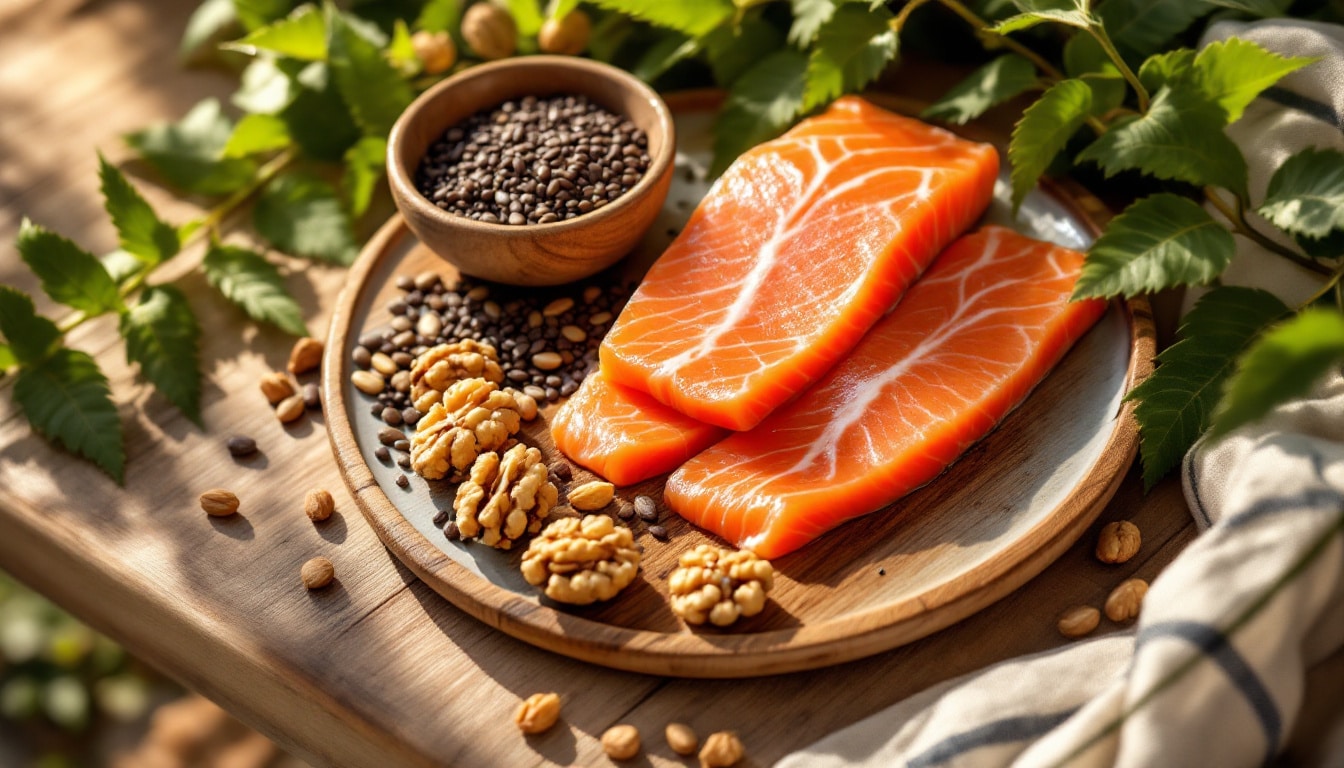Unlock the potential of your health with the incredible benefits of omega-3-rich superfoods! These nutrient powerhouses not only elevate your diet but also pave the way for optimal health and longevity. Omega-3 fatty acids, essential for our body’s functioning, can be obtained from a variety of delectable food sources, each brimming with unique flavors and textures.
Incorporating omega-3 superfoods into your meals doesn’t have to be a challenge. In fact, it’s an exciting culinary adventure. These superfoods, including fatty fish like salmon, mackerel, and sardines, deliver high concentrations of the coveted DHA and EPA omega-3s. For those following plant-based diets, options like chia seeds, flaxseeds, and seaweed shine as exceptional sources of ALA omega-3s.
But why are omega-3 fatty acids so crucial? They play a vital role in supporting various bodily functions, including the cardiovascular, immune, and mental health systems. By reveling in the diverse world of omega-3-rich superfoods, you can savor delicious meals while simultaneously fueling your journey towards enhanced well-being and longevity!

Table of Contents
ToggleUnderstanding Omega-3-Rich Superfoods
In recent years, the recognition of omega-3 fatty acids as a vital component of our diet has skyrocketed. These essential fatty acids are celebrated for their profound health benefits, particularly regarding heart and brain health. Omega-3s come in three primary forms: ALA (alpha-linolenic acid), DHA (docosahexaenoic acid), and EPA (eicosapentaenoic acid). Although the body can convert ALA from plant sources into DHA and EPA, this conversion process is not very efficient. Therefore, consuming a diverse array of omega-3-rich superfoods is crucial to ensure you’re meeting your body’s demands.
Exceptional Food Sources of Omega-3 Fatty Acids
When discussing omega-3-rich superfoods, one cannot overlook the powerful foods that can elevate your health. Fatty fish such as salmon, mackerel, and sardines are among the top sources of DHA and EPA. For instance, a mere 3-ounce serving of salmon can deliver approximately 1.5 grams of DHA and EPA combined. Studies have shown that individuals who include fatty fish in their diets experience a reduced risk of cardiovascular disease, with a meta-analysis revealing up to a 50% reduction in heart disease risk associated with regular fish consumption.
However, it’s not just fish! Plant-based sources are equally crucial for those seeking alternative omega-3 sources. Chia seeds and flaxseeds rank high, containing 5.06 grams and 2.35 grams of ALA per ounce, respectively. Research indicates that incorporating these seeds into your daily intake can provide additional health benefits such as improved digestive health and enhanced dietary fiber. In fact, a study published in the Journal of Nutritional Biochemistry found that participants who added chia seeds to their diets displayed significant improvements in bowel health metrics.
Seaweed and algae offer an exciting option for vegetarians and vegans craving DHA and EPA. Algal oil supplements are derived from various algae species and provide a viable alternative to fish-derived omega-3s. With studies revealing that algae-derived omega-3s can support cognitive function and mood regulation, integrating these superfoods into your diet can enhance overall well-being.
The Health Benefits of Omega-3 Superfoods
Omega-3 fatty acids do more than just support heart and brain health; they span a wide spectrum of benefits. Research has demonstrated that these incredible fats can significantly reduce inflammation throughout the body. A study from the American Journal of Clinical Nutrition showed that regular consumption of omega-3s led to a decrease in inflammation markers in participants with chronic inflammatory conditions. Incorporating omega-3-rich superfoods into meals can serve as a natural anti-inflammatory remedy, fostering health improvements.
Moreover, omega-3s play a pivotal role in mental health. A comprehensive review published in the Archives of General Psychiatry found a correlation between low omega-3 levels and increased rates of depression and anxiety. Participants in treatment programs who increased their omega-3 intake often reported narrowed symptoms of anxiety and improved emotional health. This aspect reflects the necessity of omega-3 foods as they not only nourish the body but also support mental resilience.
Two particular superfoods worth mentioning are wild-caught salmon and walnuts. While salmon provides a direct source of DHA and EPA, walnuts are an excellent way to increase ALA intake. A serving of walnuts contains around 2.57 grams of ALA. Recent studies indicate that regular walnut consumption aids in enhancing cognitive function, making them a superb friend for brain health.
Strategies for Incorporating Omega-3 Superfoods into Your Diet
Including omega-3-rich superfoods in your diet doesn’t have to be complex! Here are some practical strategies to enhance your omega-3 intake:
- Start Your Day Right: Add chia seeds to your breakfast routine! You can sprinkle them on oatmeal or blend them into a smoothie. Not only do they provide omega-3s, but they also add texture and a delightful nutty flavor.
- Smart Snacking: Consider enjoying a handful of walnuts or edamame as a mid-afternoon snack. These plant-based snacks offer a generous dose of ALA, perfect for maintaining energy throughout the day.
- Explore New Recipes: Seek out recipes featuring fatty fish like salmon. Grilling or baking salmon with a splash of lemon and herbs can transform the fish into a culinary delight while offering substantial health benefits.
- Experiment with Seaweeds: Incorporating seaweed into salads or wraps can elevate your meals and provide necessary omega-3 fats. Seaweed is not only versatile but also packed with vitamins and minerals.
Furthermore, consider consulting professional dietitians or nutritionists who can tailor dietary recommendations to your lifestyle and health goals. This personalized approach ensures you’re getting adequate amounts of omega-3s without compromising on other essential nutrients.
Remember, the journey to a healthier diet rich in omega-3s is also about balance. While it’s essential to incorporate these superfoods, maintaining diversity in your diet will guarantee you’re getting a well-rounded array of nutrients. Incorporating omega-3-rich superfoods can result in not just enhanced physical health but also improved emotional well-being!

Frequently Asked Questions about Omega-3-rich Superfoods
R: Omega-3 fatty acids are a type of essential fat that the body cannot produce on its own, meaning they must be obtained through diet. They are crucial for maintaining cell function and overall health.
Q: What are the main types of omega-3 fatty acids?
R: There are three primary types of omega-3 fatty acids: EPA (eicosapentaenoic acid), DHA (docosahexaenoic acid), and ALA (alpha-linolenic acid). Fish and seafood typically contain high levels of DHA and EPA, while plant sources are primarily rich in ALA.
Q: Which foods are high in omega-3 fatty acids?
R: Some of the best sources of omega-3 fatty acids include fatty fish like salmon, mackerel, sardines, and shellfish like oysters. Plant-based sources include chia seeds, flaxseeds, hemp seeds, walnuts, and seaweed.
Q: Why are omega-3 fatty acids important for health?
R: Omega-3 fatty acids support various aspects of health, including heart health, brain function, and inflammation reduction. They play a significant role in the cardiovascular, respiratory, immune, and endocrine systems.
Q: Can I get enough omega-3 if I follow a vegan or vegetarian diet?
R: Yes! Vegans and vegetarians can obtain omega-3 fatty acids through sources like chia seeds, flaxseeds, hemp seeds, and algae oil, which contains both DHA and EPA.
Q: Should I consider taking omega-3 supplements?
R: If you find it challenging to meet your omega-3 needs through diet alone, supplements such as fish oil, cod liver oil, or algae oil can be beneficial. However, consult with a healthcare professional before starting any supplement.
Q: What is the difference between DHA and EPA?
R: Both DHA and EPA are omega-3 fatty acids, but they serve different functions in the body. DHA is particularly important for brain health, while EPA is known for its anti-inflammatory properties and impact on heart health.
Q: How can I incorporate more omega-3-rich foods into my diet?
R: You can incorporate omega-3-rich foods by adding fatty fish to your meals, using chia seeds or flaxseeds in smoothies and baked goods, and snacking on walnuts or edamame.





